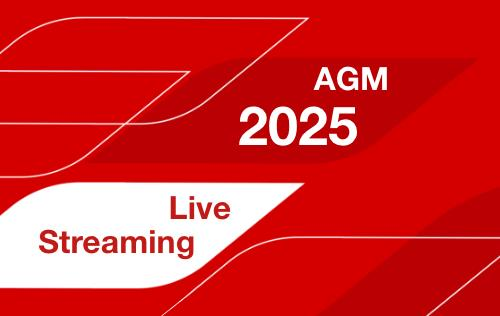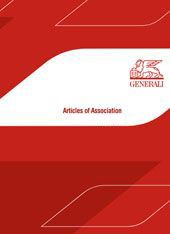Annual General Meeting
The resolutions passed by the General Meeting on the subjects falling within its powers express the will of the shareholders; resolutions passed in compliance with the legislation and the Articles of Association are binding on all shareholders, including absent and dissenting shareholders.
The AGM 2025 was held on April 24th, 2025..
The documents about the past General Meetings are available in the general archive.
Call of General Meeting
The General Meeting is called at least once a year, by notice published on our website at least 30 days before the date set for the first or only call of the General Meeting, specifying the date, time and place of the meeting, the list of subjects to be discussed, and the further information required by the applicable legislation. An extract from the notice is also published in some national newspapers, and it is sent directly to the shareholders who attended the most recent Meetings.
In the case of the General Meeting called to elect the members of the Board of Directors and the Board of Statutory Auditors, the notice of call is published at least 40 days before the date of the General Meeting, whereas for the General Meetings specified in ss. 2446 (Reduction of capital due to losses), 2447 (Reduction of share capital below statutory limit) and 2487 (Appointment and revocation of liquidators; liquidation criteria) of the Civil Code, the deadline is postponed to the 21st day before the date of the General Meeting.
The General Meeting convened to approve the financial statements is called within 120 days of the end of the financial year; if the statutory conditions are met, the said period can be extended to 180 days. It is usually held in Trieste, but can be held anywhere in Italy.
The General Meeting cannot pass resolutions on subjects not listed in the agenda.
Shareholders who, either individually or jointly, represent at least 2.5% of the share capital may, within 10 days of publication of the notice of call of the General Meeting, request additions to the list of items to be discussed, indicating in their application the additional subjects they propose, or submit specific motions regarding items already on the agenda.
Right to submit questions before General Meeting
Holders of voting rights may ask questions about the items on the agenda even before the General Meeting, but not later than the deadline set in the notice of call. The question must be accompanied by the questioner’s name and contact details. Entitlement to exercise the right to ask questions is certified by a notice issued by the intermediary depositary.
The Company checks the questioner’s entitlement and the relevance of the questions received and replies in the way and with the timing set out in the notice of call. The Company may give a single answer to all questions with the same contents.
For further information, see the section of the website devoted to the next General Meeting.
Proxy votes
Shareholders may appoint proxies to represent them at the General Meeting; by law, only one proxy can be appointed for each General Meeting, save for the power to indicate substitutes, but a different proxy can be appointed for each of the accounts to which the intermediary’s notice relates.
For each General Meeting the Company designates a party that shareholders can appoint as proxy with voting instructions on some or all of the items on the agenda; the identity of the said party designated by the Company, and the procedures and time limits for shareholders to appoint a proxy, are indicated in the notice of call of the General Meeting. Proxies can be appointed in writing or in electronic form, in compliance with the current legislation and according to the procedures specified in the applicable regulations. The appointment of the proxy can be notified to the Company in a specific section of the website or by certified e-mail, by the procedures indicated in the notice of call.
Attendance at General Meeting
The General Meeting is one of the main opportunities for discussion between shareholders and the Company’s top management. During the proceedings, the report on the business trend presented by the top management is traditionally followed by a debate between shareholders and management in question and answer form.
Shareholders holding voting rights can attend the General Meeting, provided that they prove their entitlement in the statutory forms. Entitlement to attend the General Meeting and exercise voting rights is certified by a notice sent to the Company by the intermediaries in accordance with their books of account, on the basis of evidence relating to the end of the accounting day on the 7th market trading day before the date set for the first or only call of the General Meeting. Debit and credit entries in the accounts made after that date are not taken into account for the purpose of entitlement to vote. The notice issued by the intermediary that keeps the accounts relating to the shares must be received by the Company by the end of the 3rd market trading day prior to the date set for the first or only call of the Meeting, or within such different period as may be indicated in the notice of call, and in any event before the start of proceedings on each call of the Meeting.
The Chairman presides over the discussion, and invites those who have requested in writing to speak on a specific item on the agenda to take the floor; the request can be made at any time after the Chairman has read out the agenda, until the discussion on the subject in question is closed. The Chairman can also authorise attendees to submit requests to speak by raising their hand. Board members and Statutory Auditors can also ask to speak during the discussion.
All those authorised to speak at the General Meeting are entitled to speak for a maximum of 15 minutes on each of the items under discussion, provided that their speeches are relevant to the items on the agenda. The Chairman, having regard to the importance of the subject under discussion, the number of people asking to speak and the number of items on the agenda, may impose a different time limit for speeches at any time. The Chairman and, on his invitation, those assisting him, usually answer questions when all speeches on the item in question have been made. Those who have already spoken during the discussion are entitled to reply once only, for a maximum of 5 minutes.
General Meeting majorities
Except for special cases specified by the legislation, the General Meeting is constituted and passes resolutions by the majorities listed in the table below:
| MEETING | Quorum | 1st call | 2nd call | 3rd call (and subsequent) |
single call |
| Ordinary | Constituting | ≥ 50% of the share capital |
> 0% of the share capital |
N.A. | > 0% of the share capital |
| Deliberating | > 50% of the voting share capital |
> 50% of the voting share capital |
N.A. | > 50% of the voting share capital |
|
| Extraordinary | Constituting | > 50% of the share capital |
> 33.33% of the share capital |
> 20% of the share capital |
> 20% of the share capital |
| Deliberating | ≥ 66.67% of the voting share capital |
≥ 66.67% of the voting share capital |
≥ 66.67% of the voting share capital |
≥ 66.67% of the voting share capital |
In some cases the Company has established different majorities from the statutory majorities for passing resolutions. The majorities required for the Ordinary General Meeting are needed to pass resolutions regarding:
- the annual financial statements;
- distribution of the net profit;
- appointment of the Board of Directors, the Board of Statutory Auditors and its Chairman;
- remuneration policies for members of the Board of Directors, the Board of Statutory Auditors and the Company’s key personnel in accordance with the applicable legislation in the sector, including remuneration plans based on financial instruments;
- the fees of the Board of Directors and the Board of Statutory Auditors;
- the appointment of external auditors during the financial year to audit the annual financial statements and consolidated financial statements, and determination of their fees;
- any other resolutions required by law or submitted to the General Meeting by the Board of Directors in the statutory cases.
The majorities established for the Extraordinary General Meeting are required to pass resolutions on matters involving amendments to the Articles of Association, the appointment and powers of the liquidators in the event of winding-up of the Company, and in the other statutory cases.
Additional services for the Shareholders’ meeting

Helping everyone have their say
Find out how our SMEI team is helping shareholders to participate in the General Meeting
Documents
The operating procedures of the General Meeting and those relating to speeches by shareholders are governed by a specific Regulation,
available at our registered office and in the section of the Website which, together with the Regulation,
contains the Articles of Association and information about the Company’s governing bodies.



.2025-01-30-11-54-32.jpg)

